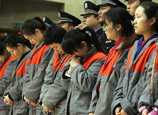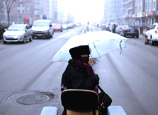
BEIJING, Feb. 4 (Xinhua) -- As the Spring Festival holiday draws near, young couples born into one-child families are struggling to decide whose parents they ought to visit.
In a country where filial piety is emphasized, people are reluctant to leave their aging parents alone, especially since the festival, which falls on Feb. 10 this year, is the most important family occasion in China.
"But we have to pick one side," complained a netizen named "Ant," adding that the festival has become a sensitive period for her and her husband because of the where-to-go debate.
Ant is a native of southwest China's Sichuan province, while her husband is from Hubei Province in central China, more than 1,000 km away. The expense and hassle of visiting both parents is too great, she said.
"It's always been a problem to decide whether to go to my home or his," she said.
Ant is not alone. China adopted its one-child policy around 1980 and most young couples nowadays come from single-child families.
Although Chinese tradition calls for wives to visit their husband's parents during the holiday, women's improved economic status has changed this custom. Chinese women, most of whom are breadwinners like their husbands, have more say in family affairs than ever before.
China's rapid development has also promoted population mobility and expanded the scope of marriage. Cross-county and cross-province marriages have become common.
Statistics show that nearly 40 percent of young couples who registered to live in Shanghai in 2009 came from different cities or regions.
Relationship advisor Su Cen said young people who come from single-child families expect their significant others to give way first, which can lead to more serious disputes.
The question of whose parents should be visited has even been touched on by police officers.
On Friday, police in the city of Qingdao in east China's Shandong Province used their account on Sina Weibo, a popular microblogging site, to dispense advice on solving such matters.
The tips included bringing the parents of both sides together, visiting each other's parents in turn every year, spending the festival separately with one's own parents and staying at home without going anywhere.
Wang Yiqi, a police officer working at the Laoshan district branch of the city's public security bureau, said the tips were dispensed because family issues have in some cases escalated to become full-fledged security problems.
In one extreme case, a woman who refused to visit her boyfriend's parents during the holiday tried to kill herself. The woman managed to slit her wrist before police came to her rescue upon receiving a call from her friends, said Wang.
"The best choice is to be considerate and understand each other," said one of the police department's posts.
















 The journey is more important than the destination:Three people who opted for an adventure tell stories.
The journey is more important than the destination:Three people who opted for an adventure tell stories.


![]()
